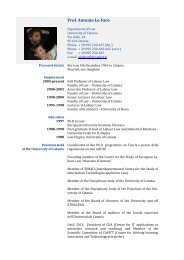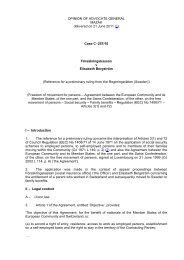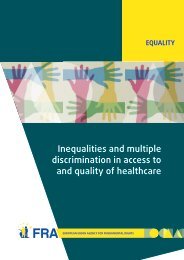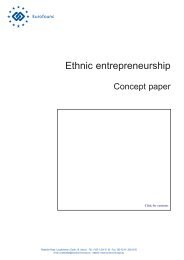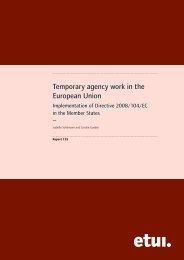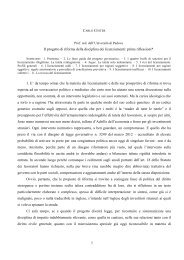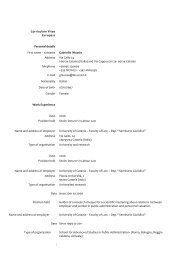Study on non-legislative initiatives for companies to promote gender ...
Study on non-legislative initiatives for companies to promote gender ...
Study on non-legislative initiatives for companies to promote gender ...
You also want an ePaper? Increase the reach of your titles
YUMPU automatically turns print PDFs into web optimized ePapers that Google loves.
Gender equality <strong>initiatives</strong> 105<br />
ti<strong>on</strong> in these programmes (that are primarily applicable <strong>for</strong> “office” jobs) is subject <strong>to</strong><br />
approval, in order <strong>to</strong> combine pers<strong>on</strong>al and work requirements best. Employees in<br />
manufacturing jobs may have opportunities <strong>for</strong> shift-trading and other flexible<br />
opti<strong>on</strong>s.<br />
Multinati<strong>on</strong>al <strong>companies</strong> that are active in Europe, such as Mo<strong>to</strong>rola Inc., in general<br />
report that, whereas flexibility in work place and in work time is used by men and<br />
women in a similar degree, it is mostly women who work part-time and who take<br />
l<strong>on</strong>ger leave periods due <strong>to</strong> the birth of a child.<br />
Job-sharing can be regarded as a very specific way of part-time working, i. e. two<br />
pers<strong>on</strong>s share <strong>on</strong>e job and these two employees negotiate and agree up<strong>on</strong> their competencies<br />
and working time themselves. The possibility of job-sharing exists (<strong>for</strong> certain<br />
positi<strong>on</strong>s) e. g. at IBM Corporati<strong>on</strong>, IKEA or Polgár-Társak 2000 Kft.<br />
Some <strong>companies</strong> also pay special attenti<strong>on</strong> <strong>to</strong> set meetings at times when it is<br />
possible <strong>for</strong> every<strong>on</strong>e <strong>to</strong> attend (i.e. not in the late afterno<strong>on</strong>s), e. g. Formastur SA or<br />
IKEA (moreover, in the latter company it is comm<strong>on</strong> practice that male or female<br />
employees may quit meetings due <strong>to</strong> child care resp<strong>on</strong>sibilities). S<strong>to</strong>rmberg dem<strong>on</strong>strates<br />
that not <strong>on</strong>ly large <strong>companies</strong> can hold teleph<strong>on</strong>e c<strong>on</strong>ferences/”meetings” <strong>on</strong><br />
teleph<strong>on</strong>e – and thereby reduce travel time of employees and allow home based<br />
employees <strong>to</strong> attend.<br />
S<strong>to</strong>rmberg AS is a Norwegian company in the retail sales business (sportswear). It<br />
started in 1998 and has had a very positive development both in number of employees<br />
and ec<strong>on</strong>omic numbers. There are about 100 employees, where 45 are women and 55<br />
are men. In the board 2 out of 5 are women and in the leader group 3 out of 8 are<br />
women.<br />
It is important <strong>to</strong> underline that the <strong>initiatives</strong> that have been implemented <strong>to</strong> support<br />
<strong>gender</strong> equality at S<strong>to</strong>rmberg are not seen as a strategy or programme by the company,<br />
but rather as an incorporated way in how S<strong>to</strong>rmberg wants <strong>to</strong> operate as an<br />
enterprise. It could be said that the measures are an internalised part of the business<br />
culture.<br />
S<strong>to</strong>rmberg has implemented several c<strong>on</strong>crete measures, am<strong>on</strong>g these are:<br />
• flexible working time arrangements;<br />
• shift arrangements;<br />
• teleph<strong>on</strong>ic meetings (<strong>to</strong> reduce travel time);<br />
• possibility <strong>to</strong> work from home (home office);<br />
• children are allowed <strong>to</strong> come <strong>to</strong> work if day care is closed, etc.;<br />
• men are motivated <strong>to</strong> take parental leave.<br />
S<strong>to</strong>rmberg underlines that focusing <strong>on</strong> family oriented/work-life balance measures, has<br />
not <strong>on</strong>ly been welcomed by the employees but has indeed also benefited the<br />
company in several ways. First, it has created stability am<strong>on</strong>g the employees. Sec<strong>on</strong>d,<br />
the level of absence due <strong>to</strong> sickness has been at around 5.2 % of <strong>to</strong>tal working time per<br />
year in the last few years, which is very low <strong>for</strong> <strong>companies</strong> in the retail business. Third,<br />
S<strong>to</strong>rmberg has been an attractive workplace both <strong>for</strong> men and women. Forth, the<br />
enterprise has also created good ec<strong>on</strong>omic results and this is partly assigned <strong>to</strong> the<br />
good balance between family/work-life.




